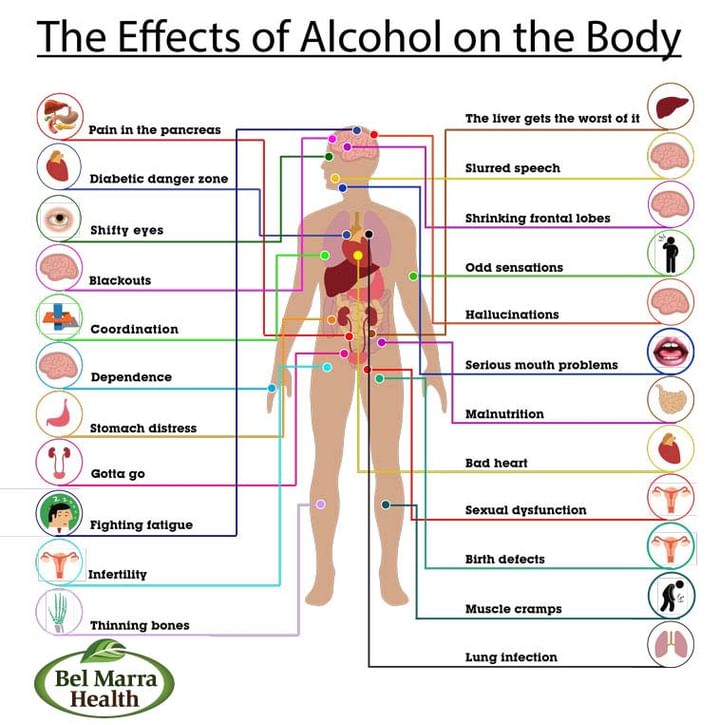The Effects of alcohol on the Body
When you drink alcohol, it's absorbed into your bloodstream and affects every part of your body. In the long term, this can put your health at serious risk.
When you drink alcohol, it's absorbed into your bloodstream and affects every part of your body. In the long term, this can put your health at serious risk.
Even a small amount of alcohol has an effect on your body. When you drink, alcohol is absorbed into your bloodstream and distributed throughout your body. A tiny amount of alcohol exits your body in your urine and your breath.
You absorb alcohol more slowly if you eat, especially if the food is high in fat. However, if you drink more than your body can process, you'll get drunk. How quickly alcohol is metabolized depends on your size and gender, among other things.
Alcohol consumption causes physical and emotional changes that can do great harm to your body. The long-term effects of alcohol abuse are many, putting your health in serious jeopardy and endangering your life.
Excretory system
The excretory system is responsible for processing and eliminating waste products like alcohol from your body. As part of that process, the pancreas secretes digestive enzymes that combine with bile from the gallbladder to help digest food. The pancreas also helps regulate insulin and glucose.
Excessive alcohol use can cause the pancreas to produce toxic substances that interfere with proper functioning. The resulting inflammation is called pancreatitis, a serious problem that can destroy the pancreas. One of the most frequent causes of chronic pancreatitis is alcohol abuse.
The liver's job is to break down harmful substances, including alcohol. Excessive drinking can cause alcoholic hepatitis which can lead to the development of jaundice (yellowing of the skin and eyes). Chronic liver inflammation can lead to severe scarring known as cirrhosis. This formation of scar tissue can destroy the liver. When the liver fails to perform, toxic substances remain in your body. Liver disease is life threatening. Women are at higher risk for alcoholic liver disease than men because women's bodies tend to absorb more alcohol and take longer to process it.
When the pancreas and liver don't function properly, the risk of hypoglycemia (low blood sugar) rises. A damaged pancreas can cause the body to be unable to utilize sugar due to a lack of insulin, which can lead to hyperglycemia. Unbalanced blood sugar levels can be a dangerous problem, especially for people with diabetes. Alcohol abuse also raises your risk of liver cancer.
Central nervous system
One of the first signs of alcohol in your system is a change in behavior. Alcohol travels through the body easily. It can quickly reach many parts of your body, including your brain and other parts of your central nervous system. That can make it harder to talk, causing slurred speech, the telltale sign that someone who has had too much to drink. It can also affect coordination, interfering with balance and the ability to walk.
Drink too much, and your ability to think clearly is in trouble, as are your impulse control and ability to form memories. Over the long term, drinking can actually shrink the frontal lobes of your brain. Acute alcoholic withdrawal can lead to seizures and delirium. And severe alcoholism can progress to permanent brain damage, causing dementia.
Damage to your nervous system can result in pain, numbness, or abnormal sensations in your feet and hands. Alcoholism can cause a thiamine (vitamin b1) deficiency, which can result in involuntary rapid eye movements, weakness, or paralysis of the eye muscles.
Men and women metabolize alcohol differently. It generally takes less alcohol to affect women.
Over time, a heavy drinker can become physically and emotionally dependent on alcohol. It may be very difficult to gain control. Unlike most other common addictions, acute alcohol withdrawal can be life threatening. Cases of severe, chronic alcohol addiction often require medical detoxification.
When an alcoholic stops drinking abruptly, they're likely to experience symptoms of withdrawal, such as:
Nausea
Anxiety
Nervousness
Tremors
In severe cases, it may lead to confusion, hallucinations (delirium tremens), and seizures. Detoxification can take between two and seven days. Medications can help prevent side effects of withdrawal.
Digestive system
Alcohol can wreak havoc on your digestive system, from your mouth all the way to your colon. Even a single incidence of heavy drinking can injure parts of your digestive tract.
Alcohol abuse can damage the salivary glands and irritate the mouth and tongue, leading to gum disease, tooth decay, and even tooth loss. Heavy drinking can cause ulcers in the esophagus, acid reflux, and heartburn. Stomach ulcers and inflammation of the stomach lining (gastritis) can occur.
Inflammation of the pancreas interferes with its ability to aid digestion and regulate metabolism. Damage to the digestive system can cause gassiness, abdominal fullness, and diarrhea. It can also lead to dangerous internal bleeding, which may be due to ulcers, hemorrhoids, or esophageal varices caused by cirrhosis.
Alcohol makes it harder for your digestive tract to absorb nutrients and b vitamins or control bacteria. Alcoholics often suffer from malnutrition. Heavy drinkers face a higher risk of mouth, throat, and esophagus cancers. Moderate drinking in the presence of tobacco use can raise the risk of these upper gastrointestinal cancers. Colon cancer is also a risk. Symptoms of alcohol withdrawal may include nausea and vomiting.
Circulatory system
In some cases, a single episode of heavy drinking can cause trouble for your heart. It's even more likely your heart will suffer if you're a chronic drinker. Women who drink are at even higher risk of heart damage than men.
Circulatory system complications include:
Poisoning of the heart muscle cells (cardiomyopathy)
Irregular heartbeat (arrhythmia)
High blood pressure
Stroke
Heart attack
Heart failure
People with diabetes have an increased risk of low blood sugar levels, especially if they use insulin. Deficiencies in vitamin b6, vitamin b12, thiamine, and folic acid can cause lowered blood counts. A common symptom of anemia is fatigue.
Sexual and reproductive health
Erectile dysfunction is a common side effect of alcohol abuse in men. It can also inhibit hormone production, affect testicular function, and cause infertility.
Excessive drinking can cause a woman to stop menstruating and become infertile. It also can increase her risk of miscarriage, premature delivery, and stillbirth. Alcohol has a huge effect on fetal development. A range of problems, called fetal alcohol spectrum disorders (fasd), can occur. Fasd symptoms, which include physical abnormalities, learning difficulties, and emotional problems can last a lifetime.
For women, the risk of breast cancer rises with alcohol use.
Skeletal and muscle systems
Long-term alcohol use makes it harder for your body to produce new bone. Drinking puts you at increased risk of osteoporosis (thinning bones) and bone fractures. Muscles become prone to weakness, cramps, and even atrophy.
Immune system
An immune system weakened by alcohol abuse has a hard time fighting off viruses, germs, and all types of illness. Heavy drinkers are more likely to get pneumonia or tuberculosis than the general population. Chronic alcohol use increases your risk of many forms of cancer.



+1.svg)
